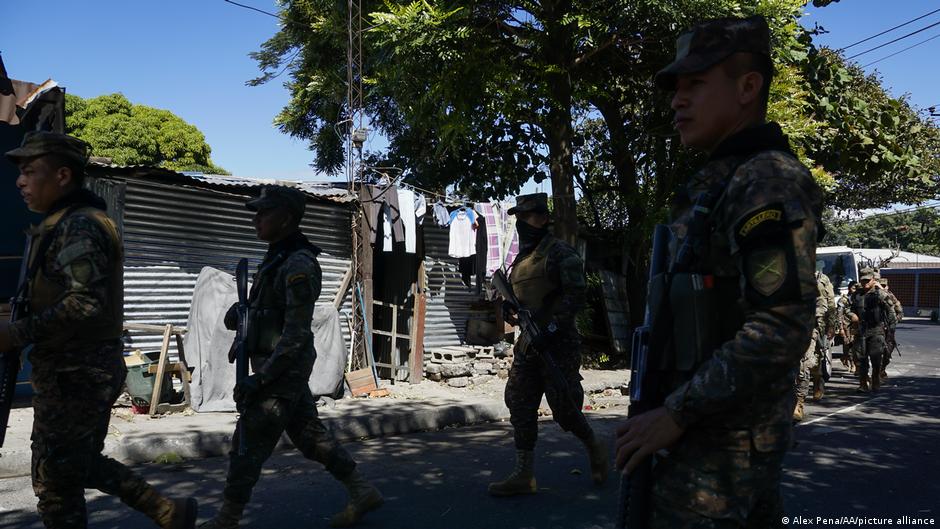The organization Socorro Jurídico Humanitario asked this Thursday (23.02.2023) the Human Rights Ombudsman of El Salvador, Raquel Caballero, to issue a public condemnation against the Government, the Congress and the Judiciary for the detentions of “innocent” people during the emergency regime in force since March 2022.
In a letter delivered at the Human Rights Ombudsman’s Office (PDDH) headquarters, they asked Caballero for a “pronouncement of condemnation against the Government, the Legislative Assembly and the Judiciary for falsely accusing innocent people.” They added that these State organs -in their opinion- have not followed “due process” and that the condemnation should also be “for not respecting the presumption of innocence established in the Constitution.”
Socorro Jurídico Humanitario also requested his intervention in the case of a 66-year-old farmer detained for more than nine months, even though “there was no evidence whatsoever” against him. The entity urged Caballero to request the “corresponding forensic expertise” to “know his state of health.”
The organization’s coordinator, Stanley Quinteros, told journalists that they have documented an increase in chronic illnesses among detainees and that “people continue to die” in state custody. “The Salvadoran state is killing our victims of the exception regime because they are not providing them with their medications,” he added.
According to official figures, under this suspension of constitutional rights, more than 64,000 people have been detained and accused by the government of being gang members, of whom more than 3,300 have been released.
Salvadoran humanitarian organizations and the Human Rights Ombudsman Office have received thousands of complaints of abuses, primarily for arbitrary detentions.
The authorities attribute to this measure and the Territorial Control Plan the drop in homicides, which according to official accounts, were 496 in 2022, 57 % less than in 2021.
El Salvador: piden a Raquel Caballero que condene capturas de “inocentes”
La organización Socorro Jurídico Humanitario pidió este jueves (23.02.2023) a la procuradora de Derechos Humanos de El Salvador, Raquel Caballero, que emita una condena pública contra el Gobierno, el Congreso y el Órgano Judicial por las detenciones de personas “inocentes” durante el régimen de excepción vigente desde marzo de 2022.
En una carta entregada en la sede de la Procuraduría para la Defensa de los Derechos Humanos (PDDH), solicitaron a Caballero un “pronunciamiento de condena hacia el Gobierno, la Asamblea legislativa y la administración de Justicia por acusar falsamente a personas inocentes”. Añadieron que estos órganos de Estado -a su juicio- no han seguido “el debido proceso” y que la condena debe ser también “por no respetar la presunción de inocencia claramente establecidas en la Constitución”.
El Socorro Jurídico Humanitario también pidió su intervención en el caso de un agricultor de 66 años detenido por más de 9 meses, a pesar de que “no había ningún tipo de prueba” en su contra. La entidad instó a Caballero a que solicite el “correspondiente peritaje forense” para “conocer el verdadero estado de salud”.
El coordinador de la organización, Stanley Quinteros, dijo a periodistas que han documentado un incremento de los padecimientos crónicos entre las personas detenidas y que “siguen falleciendo” bajo custodia estatal gente arrestada. “El Estado salvadoreño está matando a nuestras víctimas del régimen de excepción, porque no les están proporcionando sus medicamentos”, agregó.
De acuerdo con las cifras oficiales, bajo esta suspensión de derechos constitucionales, son más de 64.000 personas las detenidas, a las que el Gobierno acusa de ser pandilleros y de las que se han liberado a más de 3.300.
Las organizaciones humanitarias salvadoreñas y la PDDH han recibido miles de denuncias de atropellos, la mayoría por detenciones arbitrarias.
Las autoridades atribuyen a esta medida y al Plan Control Territorial la caída de los homicidios, que según las cuentas oficiales fueron 496 en 2022, 57 % menos que en 2021.

